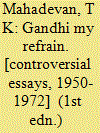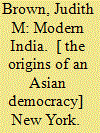| Srl | Item |
| 1 |
ID:
084399


|
|
|
|
|
| Publication |
2008.
|
| Summary/Abstract |
Democracy as political doctrine has its fair share of controversies over the adjudication of rights and the prioritization of the individual over the community. These debates have largely derived from its western genesis. The current stage of global development has however supplied many non-western perspectives on democracy which suggest that any consensus over an identifiable body of democratic thought is likely to witness more sub-diversity than ever before. This article argues that contemporary Asian thinkers on the philosophy of government have a valuable contribution to make to democratic discourse notwithstanding the clichés of the Asian Values debate of the 1990s. By performing a sampled reading of José Rizal, Sukarno and Lee Kuan Yew on their diverse interpretations of guided democracy in a nationalistic context, it will be shown that these three modern Southeast Asian political thinkers would offer some tentative Asian insights on the democracy of dignity and of responsibility.
|
|
|
|
|
|
|
|
|
|
|
|
|
|
|
|
| 2 |
ID:
097127


|
|
|
|
|
| Publication |
2010.
|
| Summary/Abstract |
The article challenges the view that democratisation is a recipe for regional disorder in East Asia. This view is not supported by evidence. Critics of democratisation fail to consider a number of mitigating factors that may check the destabilising consequences of democratisation while accentuating its peace-causing effects. These factors are not necessarily other liberal forces, like economic interdependence, or regional institutions, although these do matter. Certain dynamics associated with democratisation, such as focus on economic rebuilding for regime legitimation, positive nationalism ('democratic pride'), involvement of civil society, etc., may lessen the potential for inter-state conflict. These mitigating factors do not necessarily correspond with the normative and institutionalist logic underpinning the democratic peace theory, and they have been largely overlooked by the critics of that theory. After identifying them, this paper shows that the East Asian experience does not show that democratisation leads to greater conflict between states. On the contrary, democratisation might create better prospects for cooperative peace in the region.
|
|
|
|
|
|
|
|
|
|
|
|
|
|
|
|
| 3 |
ID:
026715


|
|
|
|
|
| Edition |
1st edn.
|
| Publication |
Bombay, Popular Prakashan, 1973.
|
| Description |
223p.hbk
|
|
|
|
|
|
|
|
|
|
|
|
Copies: C:1/I:0,R:0,Q:0
Circulation
| Accession# | Call# | Current Location | Status | Policy | Location |
| 011348 | 954.052/MAH 011348 | Main | On Shelf | General | |
|
|
|
|
| 4 |
ID:
039986


|
|
|
|
|
| Publication |
New York, Oxford University Press, 1984.
|
| Description |
xvi, 429p.hbk
|
| Series |
Short Oxford History of the Modern World
|
| Standard Number |
01919131244
|
|
|
|
|
|
|
|
|
|
|
|
Copies: C:1/I:0,R:0,Q:0
Circulation
| Accession# | Call# | Current Location | Status | Policy | Location |
| 024712 | 954/BRO 024712 | Main | On Shelf | General | |
|
|
|
|